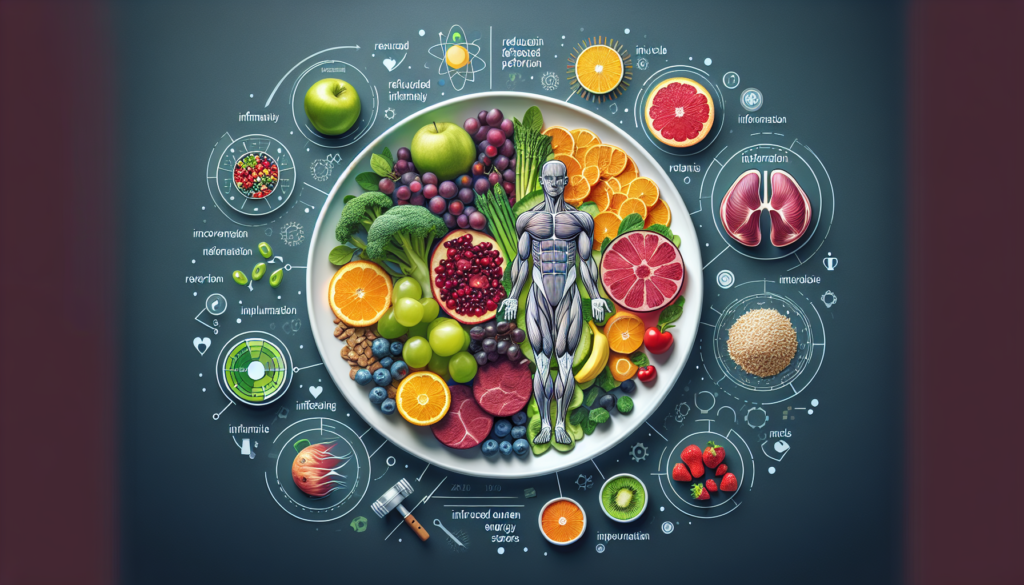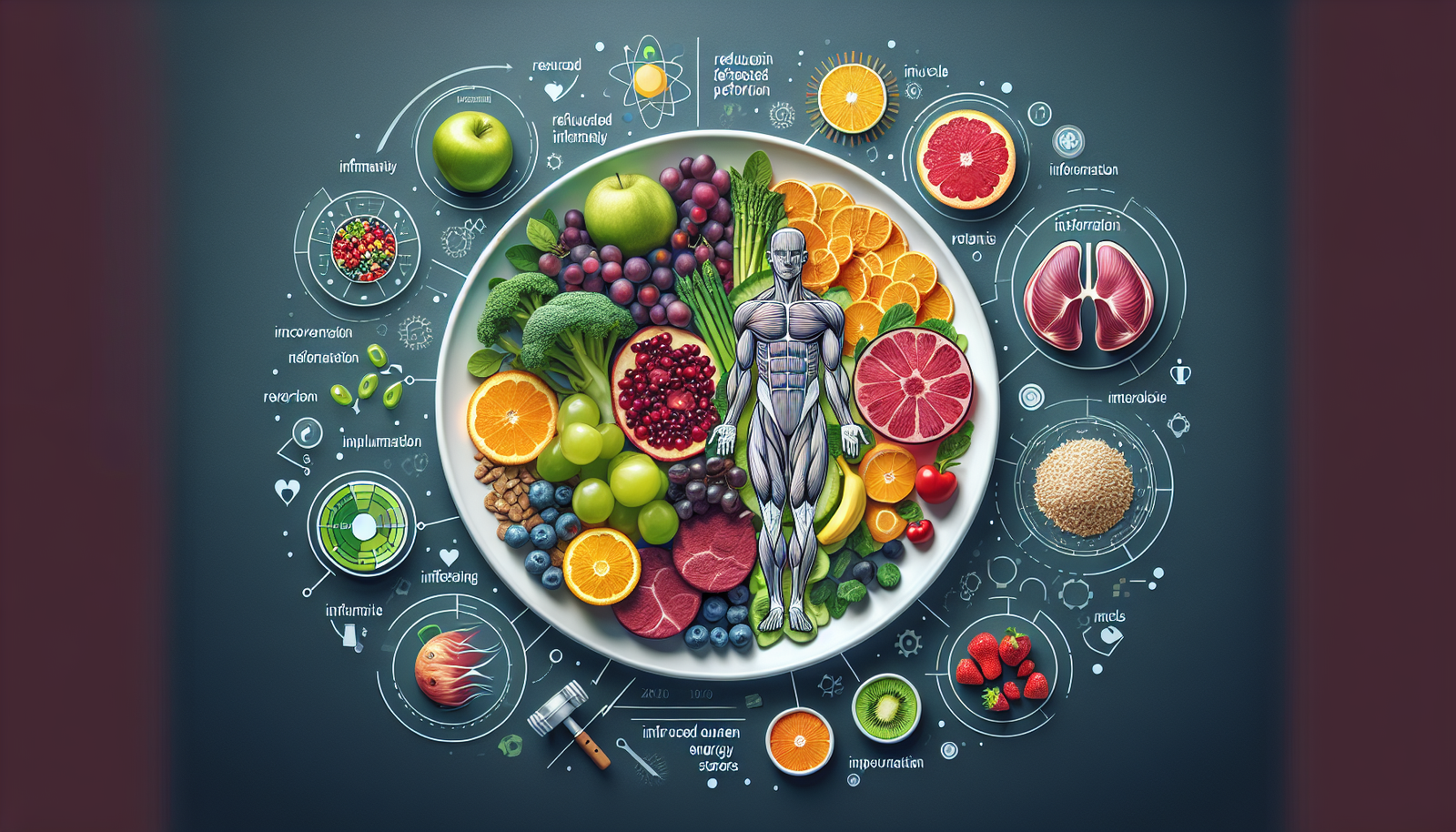Proper nutrition plays a crucial role in exercise recovery, providing the essential fuel your body needs to repair and rebuild after a workout. By replenishing depleted energy stores and supplying the necessary nutrients, a well-balanced diet supports muscle growth and promotes faster recovery, allowing you to bounce back stronger and more energized for your next workout. Whether it’s refueling with carbohydrates, repairing with protein, or nourishing with vitamins and minerals, giving your body the right kind and amount of nutrients is key to optimizing your exercise recovery.
The Importance of Proper Nutrition in Exercise Recovery
Overview of Exercise Recovery
Exercise recovery is a crucial part of any fitness routine. It refers to the period after exercise where your body repairs tissues, replenishes energy stores, and adapts to the stress placed on it during the workout. Recovery is essential for maximizing performance, preventing injuries, and achieving your fitness goals.
The Role of Proper Nutrition in Exercise Recovery
Proper nutrition plays a vital role in exercise recovery. The food you consume provides the necessary macronutrients and micronutrients to support your body’s recovery processes. A well-balanced diet ensures that you have an adequate supply of energy, nutrients, and hydration to rebuild muscle, restore glycogen levels, repair damaged tissues, and promote overall recovery.
Macronutrients for Exercise Recovery
Carbohydrates
Carbohydrates are a primary source of energy for our body. During exercise, your muscles rely on glycogen, which is stored glucose, as fuel. Consuming carbohydrates after a workout helps replenish glycogen stores. It’s recommended to include complex carbohydrates like whole grains, fruits, and vegetables in your post-exercise meal or snack to aid in recovery.
Proteins
Proteins are the building blocks of our muscles, tissues, and cells. When you exercise, you create micro-tears in your muscles, and consuming protein-rich foods helps in repairing and rebuilding these tissues. Including lean sources of protein such as chicken, fish, eggs, and legumes in your recovery meals assists in muscle repair and growth.
Fats
While carbohydrates are the main energy source during exercise, fats provide the body with essential fatty acids for overall health. Incorporating healthy fats like avocados, nuts, and seeds into your diet can help reduce inflammation, support hormonal balance, and provide sustained energy. Moderate amounts of healthy fats are beneficial for exercise recovery.

Micronutrients for Exercise Recovery
Vitamins
Vitamins are essential for various bodily functions, including exercise recovery. Vitamins such as vitamin C, vitamin E, and the B vitamins play crucial roles in repairing damaged tissues, reducing oxidative stress, and supporting immune function. Consuming a diverse range of fruits, vegetables, whole grains, and lean proteins ensures that you obtain an adequate supply of vitamins for optimal recovery.
Minerals
Minerals are important for muscle contractions, nerve function, and electrolyte balance. During exercise, you lose minerals like sodium, potassium, and magnesium through sweat. Replenishing these minerals is essential for proper hydration and preventing muscle cramps. Including foods like bananas, spinach, dairy products, and nuts in your diet can help maintain mineral balance and support recovery.
Antioxidants
Intense exercise generates oxidative stress in the body, leading to the production of free radicals. Antioxidants help combat oxidative stress and inflammation, preventing cell damage and promoting recovery. Foods rich in antioxidants, such as berries, dark leafy greens, and colorful fruits, can enhance exercise recovery and protect against exercise-induced oxidative damage.
Hydration and Exercise Recovery
The Importance of Hydration
Proper hydration is vital for exercise recovery as it helps maintain optimal performance, regulates body temperature, and aids in nutrient transport. During exercise, you lose fluids through sweat, and replenishing these fluids is crucial for rehydration. Drinking water before, during, and after a workout helps restore and maintain hydration levels.
Fluid Replacement Strategies
To ensure effective hydration during recovery, it’s important to develop fluid replacement strategies. Monitoring your body weight before and after exercise can help estimate fluid losses. The general guideline is to drink 16-24 ounces of fluid for every pound lost during exercise. Additionally, consuming hydrating foods like water-rich fruits and vegetables can contribute to your overall fluid intake.

Timing and Frequency of Nutrient Intake
Pre-Exercise Nutrition
Eating a well-balanced meal or snack before exercise provides your body with the necessary energy and nutrients to fuel your workout. Ideally, consume a combination of carbohydrates and proteins 1-3 hours before exercising. This allows your body to digest and absorb the nutrients, ensuring you have enough energy for optimal performance.
Post-Exercise Nutrition
Consuming nutrients after exercise is crucial for initiating the recovery process. Aim to eat a balanced meal or snack within 30-60 minutes after your workout. This window of opportunity helps replenish glycogen stores, promote muscle repair, and enhance recovery. Including a mix of carbohydrates and proteins in your post-exercise meal ensures optimal nutrient absorption and muscle recovery.
Replenishing Nutrients Throughout the Day
While pre- and post-exercise nutrition is important, it’s also essential to distribute nutrient intake throughout the day. Eating regular meals and snacks that contain a variety of macronutrients and micronutrients supports sustained energy, muscle repair, and overall recovery. Incorporating nutrient-dense foods into your meals and snacks ensures a continuous supply of essential nutrients for optimal exercise recovery.
Carbohydrates for Exercise Recovery
The Role of Carbohydrates
Carbohydrates are the body’s preferred source of energy during exercise. Consuming carbohydrates after a workout helps restore glycogen stores, providing the energy necessary for the next workout or activity. Including carbohydrates in your recovery meals ensures that your body has an ample supply of fuel to support muscle repair and optimize recovery.
Types of Carbohydrates for Recovery
It is advisable to include complex carbohydrates in your post-exercise meals as they are rich in fiber, vitamins, and minerals. Whole grains, such as quinoa, brown rice, and oats, are excellent choices. Fruits, vegetables, and legumes also provide carbohydrates along with other valuable nutrients. Avoid or limit simple sugars found in processed foods, as they offer little nutritional value.
Carbohydrate Timing and Amounts
Timing the consumption of carbohydrates after exercise is crucial for optimal recovery. Consuming carbohydrates within 30-60 minutes after exercise helps maximize the replenishment of glycogen stores. Aim for a carbohydrate intake of around 0.5-0.7 grams per pound of body weight within this window. Adjusting the carbohydrate intake based on exercise intensity, duration, and individual needs can further optimize recovery.
Proteins for Exercise Recovery
The Role of Proteins
Proteins play a vital role in exercise recovery as they are responsible for repairing and building muscle tissues. Consuming protein after a workout helps stimulate muscle protein synthesis and aids in the recovery and adaptation processes. Including proteins in your recovery meals ensures that your muscles have the necessary building blocks to repair and grow stronger.
Types of Proteins for Recovery
There are various sources of proteins that are beneficial for exercise recovery. Lean animal proteins, such as chicken, turkey, fish, and eggs, provide high-quality proteins and essential amino acids. Plant-based proteins, including legumes, tofu, tempeh, and quinoa, are excellent options for those following a vegetarian or vegan diet. Incorporating a variety of protein sources in your recovery meals ensures adequate amino acid intake for optimal recovery.
Protein Timing and Amounts
Consuming protein after exercise stimulates muscle protein synthesis. Aim to consume around 20-30 grams of protein within 30-60 minutes after your workout to maximize muscle recovery and growth. Adjusting protein intake based on individual needs, exercise intensity, and goals can further optimize recovery. Distributing protein intake evenly throughout the day also ensures a continuous supply of amino acids for muscle repair and recovery.
Fats for Exercise Recovery
The Role of Fats
While carbohydrates are the primary fuel source during exercise, fats play an essential role in exercise recovery. Fats provide a concentrated source of energy, help support hormonal balance, and aid in nutrient absorption. Including healthy fats in your recovery meals promotes satiety, reduces inflammation, and supports overall recovery.
Types of Fats for Recovery
Incorporating healthy fats in your diet is beneficial for exercise recovery. Unsaturated fats found in avocados, olive oil, nuts, and seeds provide essential fatty acids and have anti-inflammatory properties. Omega-3 fatty acids, found in fatty fish like salmon and trout, can also support recovery and reduce exercise-induced inflammation. Limiting intake of saturated and trans fats is recommended for overall health.
Fat Timing and Amounts
While fat intake is important for exercise recovery, it’s advisable to consume fats in moderation. Including a source of healthy fats in your post-exercise meals or snacks is beneficial, but avoid excessive fat intake within the immediate recovery window, as it may slow down digestion and nutrient absorption. Aim for a balanced intake of healthy fats throughout the day to support recovery and overall well-being.
Vitamins and Minerals for Exercise Recovery
Essential Micronutrients for Recovery
Vitamins and minerals play vital roles in exercise recovery. Vitamin C assists in collagen synthesis and tissue repair, vitamin E acts as an antioxidant, and the B vitamins help convert nutrients into energy. Minerals like potassium, magnesium, and calcium support muscle function and prevent cramps. Including a variety of fruits, vegetables, whole grains, and lean proteins in your diet ensures an adequate supply of these essential micronutrients for optimal recovery.
Food Sources of Vitamins and Minerals
To obtain the necessary vitamins and minerals for exercise recovery, focus on consuming a diverse range of nutrient-dense foods. Oranges, berries, leafy greens, nuts, seeds, whole grains, lean meats, and dairy products are rich in essential micronutrients. Incorporating these foods into your recovery meals and snacks ensures that you’re providing your body with the necessary vitamins and minerals for efficient recovery.
Meal Planning for Exercise Recovery
Creating Balanced Recovery Meals
Meal planning plays a crucial role in supporting exercise recovery. Designing balanced recovery meals ensures that you’re providing your body with the necessary macronutrients and micronutrients for optimal recovery. Include a combination of carbohydrates, proteins, and healthy fats in each meal. Filling half your plate with colorful fruits and vegetables, a quarter with lean proteins, and a quarter with whole grains or starchy vegetables can serve as a general guideline for creating balanced recovery meals.
Snack Ideas and Recipes
In addition to meals, incorporating nutritious snacks can further support exercise recovery. Snacks should contain a mix of carbohydrates and proteins to replenish energy stores and aid in muscle repair. Examples of healthy recovery snacks include Greek yogurt with berries, a banana with almond butter, a handful of nuts with dried fruit, or a protein smoothie with spinach and a scoop of protein powder. There are many delicious and nutritious recipes available that can be tailored to your preferences and dietary needs.
In conclusion, proper nutrition is crucial for exercise recovery. Consuming a well-balanced diet that includes macronutrients, micronutrients, and adequate hydration supports tissue repair, replenishment of energy stores, and overall recovery. By understanding the role of carbohydrates, proteins, fats, vitamins, minerals, and hydration, you can optimize your exercise recovery and achieve your fitness goals. Incorporate these nutrition recommendations into your routine and enjoy the numerous benefits of proper nutrition in exercise recovery.


